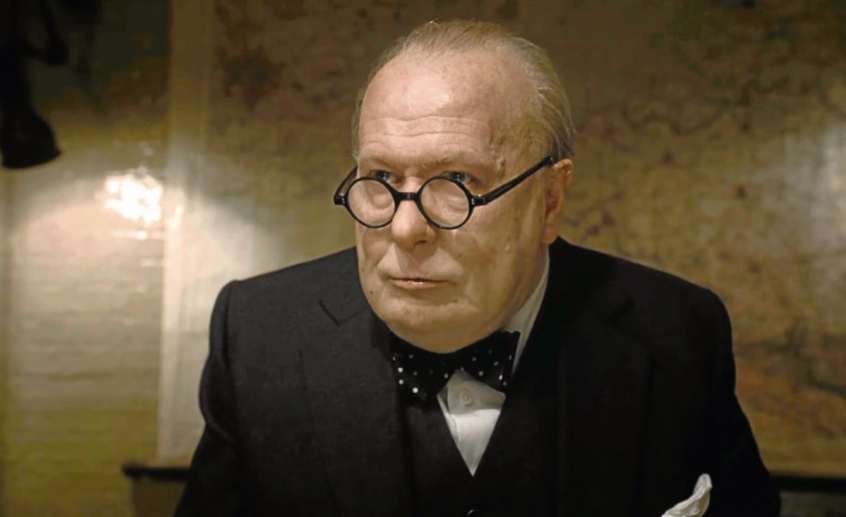It's rare to find a work of mainstream art these days that accurately reflects a passage of scripture. The Bible was once a routine source of inspiration for cultural pioneers everywhere, as the great works of fine art hanging in our national galleries can testify. Today though, preachers everywhere wait thirstily for a scrap of cultural connection to be thrown from the tables of the film and music industries. Yet, whether he intended to or not, with his film Darkest Hour, director Joe Wright has will send culturally-relevant pastors into a rapturous spin. It's essentially a two-hour meditation on a single verse: 'The light shines in the darkness, and the darkness has not overcome it' (John 1:5).

Gary Oldman's central performance in the film as wartime Prime Minister Winston Churchill is rightly drawing most of the attention and awards buzz. It is an astonishing portrayal of a figure seen countless times on screen before, sympathetic, powerful and complex. It's a career-defining moment for the unrecognisably transformed Oldman, and an Oscar-baiting one at that.
Yet Wright's craftsmanship in creating a beautiful piece of art must not be overlooked. Oldman and his excellent supporting cast tell a wonderful story, but Wright's masterfully-intentional direction unpacks the greatest of themes on a canvas that is simultaneously huge, and tiny.
It's a big story – of course – about one of the key turning points of the Second World War. Western Europe has fallen,and the British army is in full retreat and at risk of annihilation (the film is a perfect companion piece to last year's Dunkirk). The UK government is in crisis and Neville Chamberlain (rather poorly treated by the film) is forced to resign. Churchill takes power and is faced with the almost impossible task of mounting a defensive operation. The darkness is almost overwhelming; this is indeed the nation's darkest hour.
At the same time, Wright wants to tell the much smaller story of one man, thrust into the spotlight at this impossible moment, and how he wrestles with his own flaws to somehow emerge as the great leader of legend. Despised by almost everyone except his family, Churchill must win over almost everyone, keeping his head as all around are losing theirs. The King (beautifully portrayed by Ben Mendelsohn – a hard task post-Colin Firth) has major doubts, the rest of his ruling party are already planning his demise. For Churchill the man, this is the darkest hour of his leadership, and the loneliest.
Darkness is a heavy presence in the film, and Wright uses it to create a feeling of almost overwhelming dread. Yet ultimately, this is film about the light breaking through: the miracle of Dunkirk and the unexpected survival of the army, the swell of support for Churchill and the beginning of the surge which five years later won the war.
Light itself is almost a character in the film, bringing a tiny element of hope into scenes that have almost lost it. Wright isolates Churchill in a dimly lit lift in an otherwise total darkness, or illuminates one corner of a darkened room. A single lightbulb buzzes as if to prove that the fragile chance of overcoming the odds is still alive; the bright red light of the BBC recording studio speaks of defiance even as Churchill addresses the beleaguered nation. In almost every scene, the light shines out, somehow unsubsumed by the prevailing darkness.
This is, inescapably, the message of the Bible. We see this story told time and again through Scripture, from Joseph's rise from obscurity to Israel's escape from Egypt; from Daniel's lion-dodging to Paul's liberation from prison. Most clearly of all though, we see it in the central story of the gospel, of Jesus seemingly dead and buried, then risen from the dead to bring hope to all. And while that is not the story that Wright is telling here, it is resonant with it. One repeated trick employed by Wright sees the camera ascending heavenwards from the ground, until the characters on the earth below become too small to perceive. It's as if he's saying: only God's help could possibly have saved the world as Hitler advanced. It's a nod to the transcendent, divine nature of hope in the darkest moment.
Darkest Hour isn't perfect. There's one truly awful scene featuring Churchill talking to normal people on the tube, which is strangely ham-fisted, sentimental and unfortunately far too central to the plot to ignore. It's an odd slip in an otherwise truly superb piece of storytelling, which should be a major contender throughout the coming awards season. Kristin Scott Thomas deserves a mention for a wonderful performance as Churchill's wife Clementine, without which we might not sympathise with the man or understand his humanity, and Anthony McCarten's script is brilliantly witty without reducing Churchill to a mere deliverer of classic one-liners.
Wright's film is one of the finest of the year, and a frightening reminder of how close the world came to irrevocable disaster. Yet the light shines in the darkness, both in an eternal and historical sense. Darkest Hour makes us grateful that this was true in 1940, and remains true today.
Martin Saunders is a contributing editor for Christian Today and the deputy CEO of Youthscape. Follow him on Twitter @martinsaunders.













